标签:
操作系统三大功能:
进程描述符task_struct数据结构
task _ struct:为了管理进程,内核必须对每个进程进行清晰的描述,进程描述符提供了内核所需了解的进程信息。
进程的状态:Linux进程的状态(就绪态、运行态、阻塞态)
进程的标示pid:用来标示进程
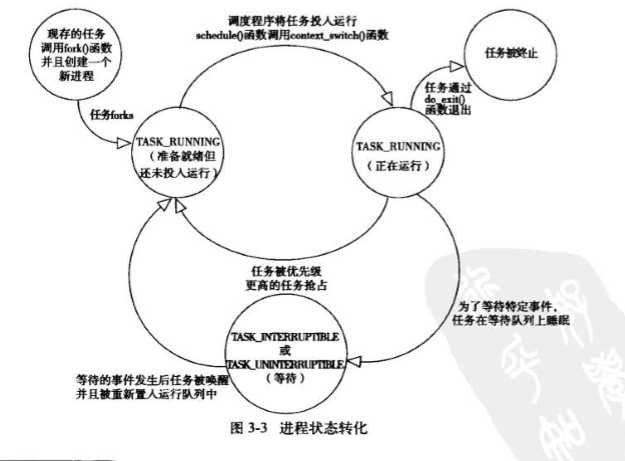
进程描述符task_struct数据结构(重要部分):
1 struct task_struct { 2 volatile long state; /* 进程的运行状态-1 unrunnable, 0 runnable, >0 stopped */ 3 void *stack; /*指定了进程的内核堆栈*/ 4 atomic_t usage; 5 unsigned int flags; /* 每一个进程的标识符 */ 6 7 int on_rq; /*运行队列*/ 8 9 pid_t pid; /*进程标识符*/ 10 11 struck list_head task; /*进程链表*/ 12 13 /*父子进程*/ 14 struct task_struct __rcu *real_parent; /* real parent process */ 15 struct task_struct __rcu *parent; 16 17 struct list_head children; /* list of my children */
start _ kernel代码中的rest _ init创建两个内核线程,kernel _ init和kthreadd。
kernel _ init将用户态进程init启动,是所有用户态进程的祖先。
kthreadd是所有内核线程的祖先。
0号进程是所有线程的祖先。(0号进程时手工写的)
fork一个子进程的代码:
1 #include <stdio.h> 2 #include <stdlib.h> 3 #include <unistd.h> 4 int main(int argc, char * argv[]) 5 { 6 int pid; 7 /* fork another process */ 8 pid = fork(); 9 if (pid < 0) 10 { 11 /* error occurred */ 12 fprintf(stderr,"Fork Failed!"); 13 exit(-1); 14 } 15 else if (pid == 0) 16 { 17 /* child process */ 18 printf("This is Child Process!\n"); 19 } 20 else 21 { 22 /* parent process */ 23 printf("This is Parent Process!\n"); 24 /* parent will wait for the child to complete*/ 25 wait(NULL); 26 printf("Child Complete!\n"); 27 } 28 }
这里特别说明一下:else if和if两个模块的代码都会被执行,子进程和父进程都会返回,子进程返回0,父进程返回子进程pid。
1. 删除menu,克隆新的menu。
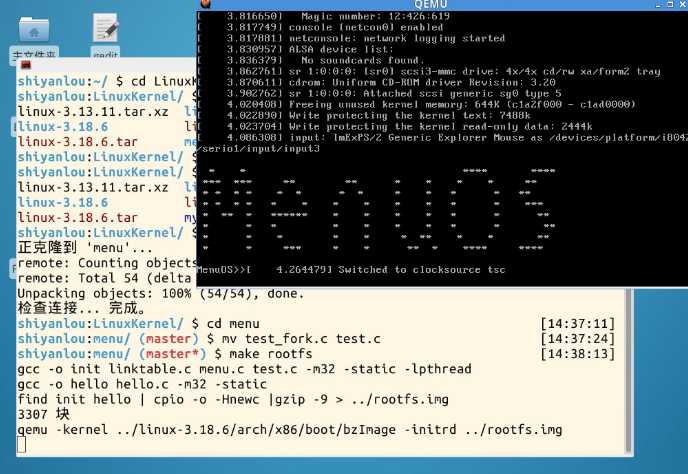
2.查看help
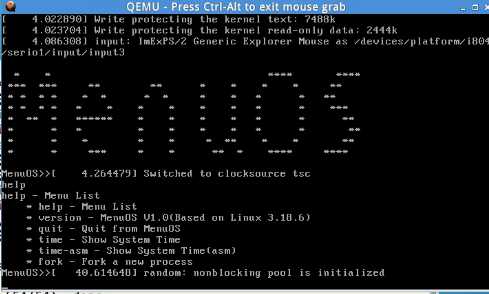
3.gdb调试
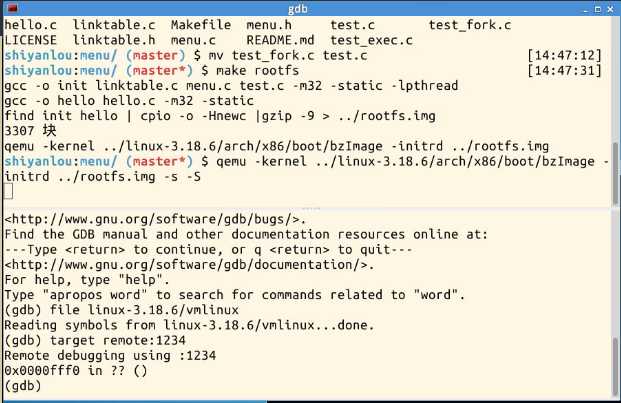
4.设置断点
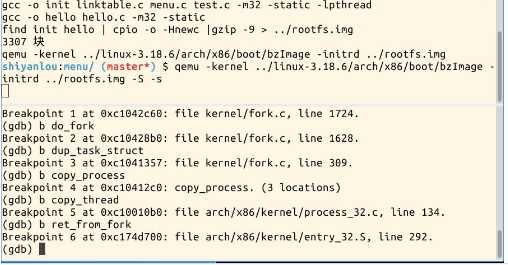
5.单步追踪




总结:
新的进程从哪里开始?
1 *childregs = *current_pt_regs(); //复制内核堆栈 2 childregs->ax = 0; //为什么子进程的fork返回0,这里就是原因! 3 4 p->thread.sp = (unsigned long) childregs; //调度到子进程时的内核栈顶 5 p->thread.ip = (unsigned long) ret_from_fork; //调度到子进程时的第一条指令地址
Linux通过复制父进程来创建一个新进程:复制父进程PCB--task_struct来创建一个新进程,要给新进程分配一个新的内核堆栈。
修改复制过来的进程数据,比如pid、进程链表等等执行copy_process和copy_thread。
设置sp调度到子进程时的内核栈顶,ip转到子进程时的第一条指令地址
之后,当子进程获得CPU的控制权开始运行的时候,ret _ form _ fork可以将后面的堆栈出栈,从iret返回到用户态,从而切换到子进程的用户空间,完成新进程的创建。
20135327郭皓--Linux内核分析第六周 进程的描述和进程的创建
标签:
原文地址:http://www.cnblogs.com/20135327leme/p/5350009.html